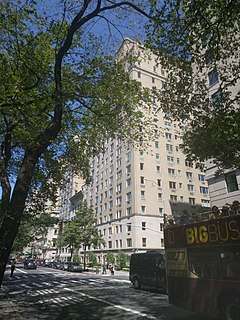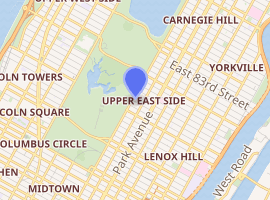930 Fifth Avenue
930 Fifth Avenue is a luxury apartment building on Fifth Avenue on the northeast corner of East 74th Street in the Upper East Side of Manhattan, New York City. The eighteen-story structure and penthouse was designed by noted architect Emery Roth and built in 1940.[2][3][4][5] According to architecture critic Paul Goldberger, 930 and 875 Fifth Avenue show Roth in transition from historicist to modern Art Deco style.[6]
| 930 Fifth Avenue | |
|---|---|
 | |

| |
| General information | |
| Type | Cooperative apartments |
| Architectural style | Classicizing Modern |
| Location | Upper East Side, Manhattan, New York City, U.S. |
| Coordinates | 40.773814°N 73.965561°W |
| Completed | 1940 |
| Owner | Fifth Avenue Apartments, Inc. |
| Height | 210.44 feet (64.14 m) |
| Technical details | |
| Floor count | 19 |
| Design and construction | |
| Architect | Emery Roth |
| References | |
| [1] | |
The Fifth Avenue location previously held three private residences which were the estates of Gordon S. Rentschler, Jacob Schiff and Simeon B. Chapin, and were bought by Percy and Harold D. Uris and razed for the new building,[7][8] which has been described as featuring "a restrained Italian Renaissance style."[7] The building is located within the Upper East Side Historic District.
Critical reception
A 1978 review of Roth's work by architecture critic Paul Goldberger in The New York Times commented that "the Roth firm took on modernism slowly--the Normandy apartments of 1938 at 140 Riverside Drive have an Art Deco-like base, but the ornamental housing for the water tower lurches back suddenly to the Italian Renaissance. There were a few other such schizophrenic designs from the 1930s and buildings such as 930 Fifth Avenue and 875 Fifth Avenue of 1940 show a gradual disappearance of the old ornament."[9]
In 1981, the Times remarked of the residential buildings constructed by the Uris Brothers, "930 Fifth Avenue, 2 Sutton Place, and 880 Fifth Avenue, are among the city's best residential addresses today."[10] Residents of the building have included Samuel and Bella Spewack, Patrick Dennis, Cornelius Vander Starr, Stanley and Karen Walker, Risë Stevens, Nancy Hanks, Woody Allen[11] and Eldridge Haynes.[3][12][13][14][15][16]
References
- "930 5th Avenue". Emporis. Retrieved June 26, 2018.
- Ruttenbaum, Steven (1986). Mansions in the Clouds: The Skyscraper Palazzi of Emery Roth. Balsam Press. pp. 179–181. ISBN 0-917439-09-0.
- Kelly, Kate (July 25, 1999). "Woody Allen's Fifth Avenue Co-op Up for Grabs for $15 Million". The New York Observer.
- "NEW APARTMENTS OVERLOOKING CENTRAL PARK". The New York Times. September 27, 1940. Retrieved March 1, 2010.
- Aunapu, Greg (February 28, 2009). "Emery Roth: Another perilous time for designing icons". The Real Deal. Archived from the original on February 13, 2010. Retrieved March 1, 2010.
- On the rise: architecture and design in a post modern age, Paul Goldberger, Penguin Books, 1985, p. 213
- "3 MORE MANSIONS ON FIFTH AVE. T0 GO; Schiff, Chapin and Rentschler Homes at 74th Street Sold as Apartment Site SYMBOLS OF PASSING ERA Eighteen-Story Building to Rise After Razing of Houses Linked to Noted Families". The New York Times. August 14, 1939. Retrieved March 1, 2010.
- "On the Way Up". The New York Times. April 22, 1940. Retrieved March 1, 2010.("Steel work is nearing completion on this eighteen-story and penthouse apartment building at 930 Fifth Avenue.")
- Paul Goldberger (February 16, 1978). "Emery Roth dominated the age of apartment buildings". The New York Times. Retrieved March 1, 2010.
- Michael Specter (July 19, 1981). "HAROLD URIS RECOLLECTS WITH PRIDE". The New York Times. Retrieved March 1, 2010.
- New York: the movie lover's guide : the ultimate insider tour of movie New York, Richard Alleman, Random House, Inc., 2005, p. 188
- Ronald Kent Shelp and Al Ehrbar (2006). Fallen Giant. John Wiley & Sons. pp. 74. ISBN 0-471-91696-X.
- "New Yorkers Transform Steel and Stone Into a Suburbia in the Sky". The New York Times. July 28, 1957.
- Roberston, Nan (September 3, 1969). "Rockefeller Fund Aide Is Chosen for Arts Post". The New York Times.
- McAuley, Jordan (2007). The Celebrity Black Book. Mega Niche Media. ISBN 0-9707095-8-7.
- Myers, Erik (2001). Uncle Mame: The Life of Patrick Dennis. Da Capo Press. p. 206. ISBN 0-306-81100-6.